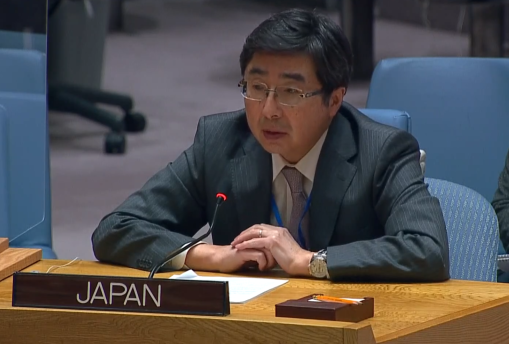女性・平和・安全保障(WPS)に関する安保理における石兼大使 ステートメント
令和4年3月8日

Madame President,
I would like to express my appreciation to the United Arab Emirates for convening this important debate on women, peace and security (WPS) with a focus on Women’s economic inclusion and participation. I thank Ms. Sima Bahous, Ms. Kristalina Georgieva and the civil society representatives for their briefings.
First of all, I would like to express our grave concern at the deteriorating humanitarian situation, including the dire impacts on women and girls, in and around Ukraine caused by the Russian aggression.
While hoping for an earliest restoration of the status quo ante bellum in Ukraine, we must also keep in mind that surviving a crisis is but the tip of the iceberg of the vast agenda of Women, Peace and Security. Women must be at the centre of all our efforts to build peaceful and resilient societies, capable of solving issues through peaceful means and free from any temptation to change the status quo by force. Participation of women is key to conflict prevention which requires long-term, comprehensive, context-specific measures including empowerment and proper institution building, under effective partnership among stakeholders.
To better explain what I mean, I would like to share one concrete example. Japan recently supported a UN Women-led project in the Lake Chad region aimed at empowering women affected by violent conflict prompted by Boko Haram. UN Women partnered with Sasakawa Africa Association, a Japanese civil society organization that has been supporting smallholder farmers in Africa for over thirty years. In this project, Sasakawa, in collaboration with local authorities in Cameroon and Nigeria, provided training to women farmers in climate-smart agriculture and in income-generating marketing skills to ensure that they will be economically empowered. The success of this project depended on combining the expertise and support of UN-Women, CSO and local authorities.
Effective partnership requires effective complementarity. And the first step to realize such complementary relationship is to enhance sharing of information and interactions among various stakeholders: the CSOs, academic institutions, private sector, and of course, the Governments and the UN entities, particularly under the conflict affected environment. The WPS-Humanitarian Action Compact, to which Japan is a signatory, could serve as a useful platform for strengthening cooperation under multi-stakeholder partnerships.
We urgently need tangible actions that different public and private partners can undertake to support gender-responsive, community-based approaches in a sustainable manner, and Japan is committed to play its part in this endeavour.
Thank you.
